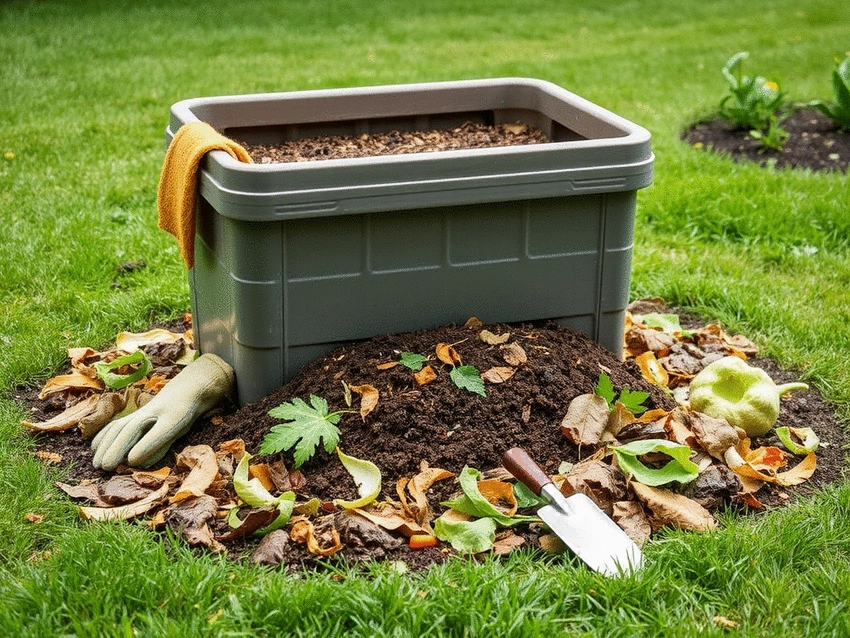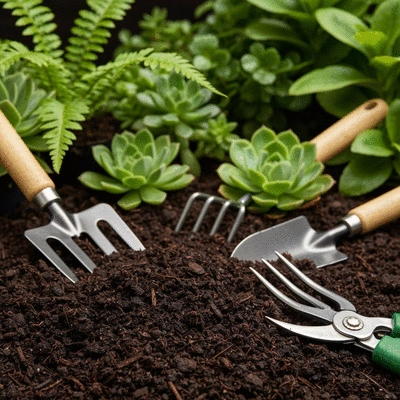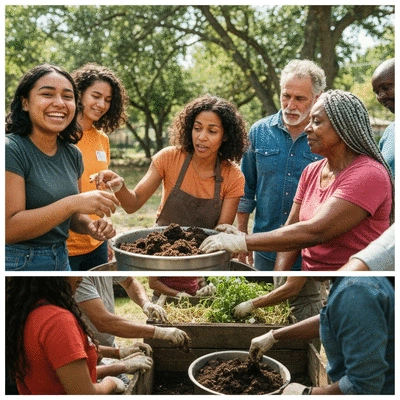Budgeting for Life in Vancouver
By Emilia Cartwright / Dec 05
The journey toward a sustainable future begins at home, and composting is a perfect place to start. As you explore the many benefits of composting, you'll discover not just how it enriches your garden, but how it contributes to a greener community in Vancouver.
This visual summarizes the environmental benefits of composting, Vancouver's waste diversion goals, and key actions for residents.
50% reduction target by 2040
Composting is more than just a trendy practice; it’s a crucial part of sustainable living here in Vancouver. With the rising costs of living, many of us are looking for ways to reduce waste and save money. Home composting not only helps the environment but can also create nutrient-rich soil for your garden, making it a win-win situation! If you're passionate about sustainability, you might also be interested in Marpole's Sustainable Street Upgrades.
As a Vancouverite myself, I’ve seen firsthand how easy it can be to start composting at home. Not only does it keep food scraps out of landfills, but it also plays a significant role in helping our city reach its waste diversion goals. So, let’s dive into the benefits of composting and why it’s important to get started!
When we compost, we’re actively participating in reducing our overall carbon footprint. Composting organic waste reduces methane emissions, a potent greenhouse gas that is released from landfills. Here are some key environmental benefits of home composting:
By composting, you’re not just cleaning up your kitchen; you’re contributing to a healthier planet! Plus, using your compost in local gardens helps foster a vibrant ecosystem right in your backyard.
Vancouver has set ambitious waste diversion goals, aiming to reduce the amount of garbage sent to landfills by 50% by 2040. Home composting is a vital part of achieving this target. When residents take the initiative to compost, they help the city in several ways:
Each compost bin contributes to the bigger picture. By participating, you’re joining a community effort that fosters sustainability and environmental stewardship in our beautiful city! For more ways to live sustainably, check out Zero Waste Shops in Vancouver.
Understanding what constitutes organic waste is essential for successful composting. Organic materials are biodegradable and are the foundation of a healthy compost pile. Common items you can compost include:
By transforming organic waste into compost, you’re not only reducing waste but also creating a valuable resource for your garden. It’s a simple way to boost plant health while keeping food scraps out of the landfill. So, why not give it a try?
Have you started composting at home? If so, what challenges or successes have you experienced? Share your thoughts below:
One of the most rewarding aspects of composting is the sense of community it fosters. In Vancouver, we pride ourselves on being a city that values sustainability and collaboration. Engaging with others not only enhances our composting skills but also builds a network of support that encourages more eco-friendly practices across our neighborhoods!
There are numerous opportunities to expand your composting knowledge right here in Vancouver! Local organizations often host workshops that are both informative and engaging. These workshops cater to a range of experience levels, helping everyone—whether you're a newbie or a seasoned composter—enhance their skills.
By participating in these workshops, you can learn about everything from the basics of composting to more advanced techniques. Plus, they often provide hands-on experience, which is the best way to learn!
Have you considered attending a composting workshop in your area? They are fantastic for hands-on learning! You’ll not only gain valuable insights but also meet fellow composters who share your passion for sustainability. Many workshops even offer materials that you can take home to start your composting journey right away!
Connecting with fellow Vancouverites can provide you with a treasure trove of insights! Social media groups and local forums often have discussions about composting practices that can help you troubleshoot issues or discover new techniques. Engaging with like-minded individuals can be incredibly motivating.
These connections can turn your composting journey into a shared adventure, inspiring everyone to adopt more sustainable practices in their daily lives.
Now that you’re equipped with the right knowledge and community support, it’s time to take action! Home composting is a fulfilling practice that not only benefits your garden but also contributes to the health of our planet. Let's explore how to effectively track your composting progress and utilize digital tools to stay organized!
In our tech-savvy world, there are plenty of digital tools available to help you keep track of your composting efforts. From apps to online calculators, these resources can simplify the process and make it more efficient!
Using these tools can make your composting experience more enjoyable and informative, allowing you to see how your efforts contribute to a greener Vancouver! For those interested in broader sustainable efforts, consider learning about Sustainable Transportation Innovations Unveiled.
As you embark on your composting journey, remember that every small step counts. Composting at home not only reduces waste but also enriches your garden soil, creating a sustainable cycle that benefits our community and environment. Each compost bin becomes a small step toward a larger goal of sustainability.
Did you know that composting can lead to another fantastic benefit: compost tea? This nutrient-rich liquid fertilizer is made by steeping compost in water and can give your plants a wonderful boost! Utilizing compost tea can enhance soil health and plant growth, making it a perfect addition to your gardening routine. It’s just one more way that composting can transform not only your garden but also your commitment to eco-friendly practices in our beautiful city.
Here is a quick recap of the important points discussed in the article:



 Budgeting for Life in Vancouver
Did you know that creating a monthly budget can be your best ally in navigating the high cost of liv
Budgeting for Life in Vancouver
Did you know that creating a monthly budget can be your best ally in navigating the high cost of liv
 Banking Basics for Vancouver Newcomers
As you embark on your journey in Canada, understanding the local banking system is crucial for your
Banking Basics for Vancouver Newcomers
As you embark on your journey in Canada, understanding the local banking system is crucial for your
 Eco-Friendly Housing in Vancouver
Have you ever considered how your home can impact the environment? Eco-friendly housing options are
Eco-Friendly Housing in Vancouver
Have you ever considered how your home can impact the environment? Eco-friendly housing options are